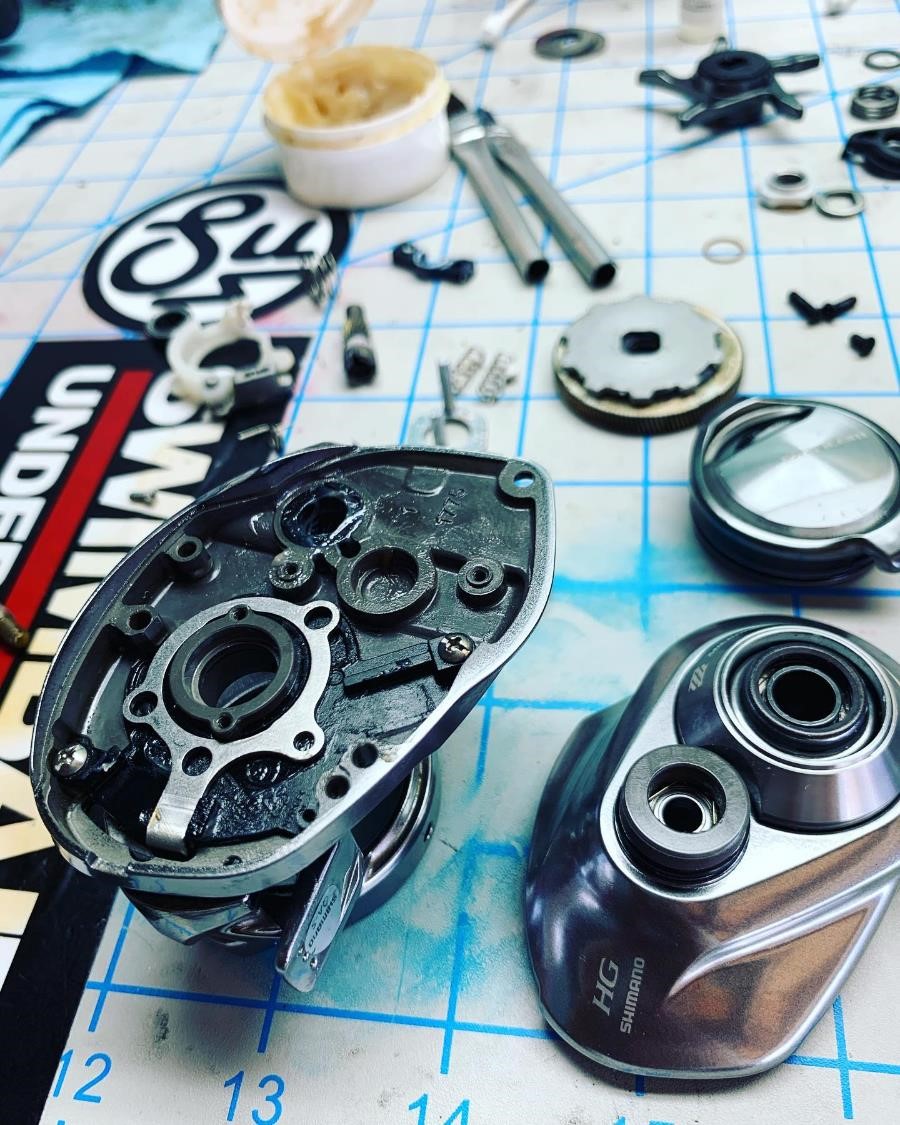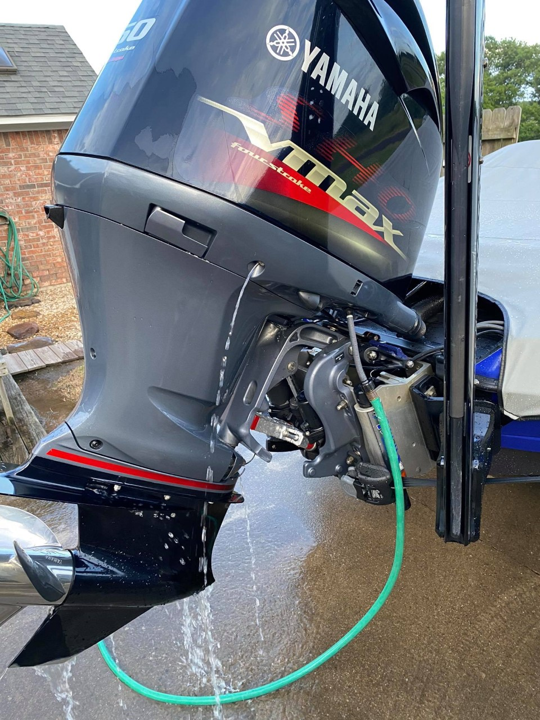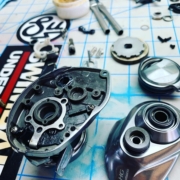Maintenance tips for any season

Have you ever had things go wrong out on the water? Let’s say you broke a rod on a hookset, your reel suddenly started messing up, or worse. Maybe your trolling motor or outboard motor fails and ruins your day of fishing. These are just a few things that could go wrong on the water, but you get the point. To prevent or reduce the chance of your equipment failing you and ruining your day, it is important to go through the maintenance process during the off-season. We will split up this maintenance blog into two different categories: (1) fishing equipment maintenance and (2) boat/trailer maintenance.
Fishing Equipment Maintenance
- Rods
- Rods seem like a simple piece of equipment that doesn’t need to be maintained, but this could not be further from the truth.
- We recently caught up with Denali Rods Pro Michael Neal who gave us a few quick tips on getting your rods ready for the new season. “The first thing I do is take a Q-Tip cotton swab and run it through all of the guides to check for any cracks, or rough spots that may fray my line. While I’m doing that I check the tip of the rod to make sure it is properly aligned, and still secure. Next I move down the rod looking for any small cracks or nicks in the blank that might compromise it. Then I finish the inspection off by making sure the reel seat is in good shape, and tightens up like it should. Those are some very simple things that everyone can do to make sure your rods are in great shape for the season” said Neal.
- Cleaning the reel seat with rubbing alcohol can be very effective also. Dirt and grime can get caught up in the reel seat and on the reel very quickly.
- Reels
- Just as cleaning your reel seat on the rod can be effective, cleaning the reel itself should also be a priority.
- While it may be easy to clean the outside of the reel, cleaning the inside of the reel can be a little more difficult. Adding a drop of reel oil on the bearings can increase the performance of a reel tremendously. To do this correctly, click the link to this video. Dirt and grime can get caught in parts of the reel, so it might be wise to clean some of that out with a Q-tip before adding oil.
- To get the full service of cleaning a reel, it would be best to send your reel off for service to the manufacturer or a local professional.
- Line
- While line on a reel should be replaced more than once a year, it is certainly important to change it before the season starts if it is unknown how old the line is. Line can become brittle from exposure to harsh conditions, such as heat or cold whether it has been used extensively or not. If you don’t plan on changing your line we recommend you at least strip off several yards and check for abrasions before hitting the water.
- Lures
- Organizing tackle boxes/bags can be extremely effective. Labeling each one with a sharpie or label will save time out on the water and make it easier to find a certain lure.
- Make sure there aren’t any rusty hooks in your boxes. Rust can spread and ruin every hook it touches if they are in the same box for a long period of time. It would be wise to check your boxes for rust BEFORE the off-season.
- Check your tackle boxes for moisture. Moisture will rust hooks and ruin the colors in soft plastic lures, and not to mention create mildew. Waterproof boxes are also an option that many anglers are using now.
- Tools
- There is nothing worse than trying to remove a hook with rusty corroded pliers when a hook is deep in a fish’s mouth. To prevent this from happening, use WD-40 to lubricate them. Any type of scissors, clippers, or pliers can be lubricated to prevent rust.
Boat/Trailer Maintenance
- Inside of the Boat
- Dirt and grime can get under the lids of compartments, behind graphs, and around the trolling motor mount. It is never a bad idea to clean these areas. Vacuuming the carpet for pieces of dirt, line, etc. is also a good idea.
- Cleaning the livewells and the drain screens in the bottom of the livewell might even save you a fish’s life.
- Open all compartments to let moisture air out during the offseason.
- Trolling Motor
- It is always wise to remove the trolling motor prop and make sure it is free of fishing line/debris inside.
- Trolling motor pull cables can often fray quicker than an angler may think, and the angler sometimes won’t even realize it until it breaks. If the cable is damaged in any way, it would not be a bad idea to replace it.
- Outboard Motor
- Check and make sure the water pump is working before taking the boat out. This can be done through hooking a garden hose up to motor muffs, meant to be placed over the water intake on the lower unit, and looking to see if the water is pumping through fully.
- Similar to removing the trolling motor prop, it is also important to remove the outboard motor prop to make sure it is free of line and debris underneath. While the prop is off, it is also wise to add some marine grease to the shaft of the outboard motor after wiping the old grease free.
- Greasing the pivot points of the outboard motor where it tilts or steers is another quick and easy task that can save you problems out on the water. Watch this video to see how easy it can be.
- Adding fuel treatment to your gas tank after letting the fuel sit for a long period of time is also important as it will prevent ethanol issues and stabilize the fuel.
- Always be sure to change your gear lube in your lower unit every year to prevent water from getting in the gear case.
- Checking the trim fluid and hydraulic steering fluid levels is also important and can prevent a headache from happening out on the water.
- Trailer
- The boat trailer is often the most overlooked parts of a boat, but it is arguably the most important. It is important to make sure the trailer winch, strap, and U-bolt on the boat are all secure and without weak points. Straps can be frayed, and a loose U-bolt underneath the boat can have a chance at causing a disastrous situation on the highway. The trailer coupler is also important to observe to make sure it is functioning properly.
- Always make sure the trailer lights are operating correctly on your boat trailer, especially at night. They must be in sequence with your tow vehicle’s lights. This includes brake lights, running lights, and turn signals.
- If your boat has trailer brakes, make sure they are working properly, and make sure the emergency brake cable is without fraying or weak spots.
- Let’s face it. Flat tires could happen at any time. Always make sure your trailer tires have enough air in them, especially in the winter when cold temperatures might cause them to lose air. One of the biggest mistakes people make is forgetting to check the air in their spare tire. Always make sure to do this when checking the other tires.
While an angler cannot control how the fish are biting or how good the conditions are, he can control reducing the risk of something going wrong when traveling to and from the lake and when on the lake. Take these tips and apply them before you hit the water.


